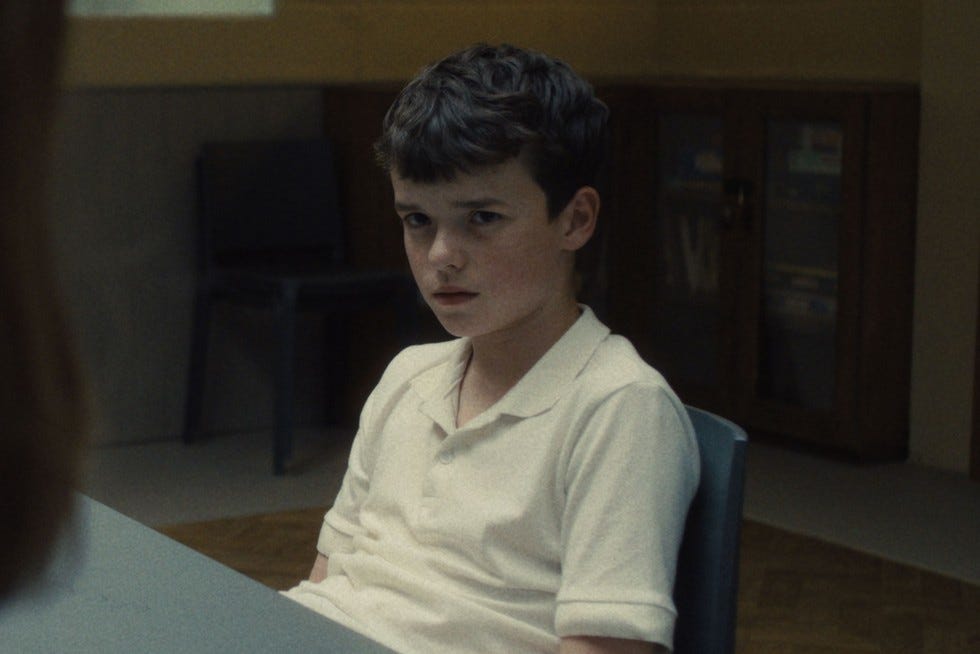What Women Are Talking About
Adolescence & the 80/20 rule, Tina Fey, Amy Poehler, the 2025 budget for basic b*itches, sperm graveyards, Lucky Girl Syndrome, Snoop Dogg
Welcome to What Women Are Talking About — your weekly curation of news and pop culture from Australia’s #1 women’s podcast Mamamia Out Loud. We’re all over the internet so you don’t have to be.
WHAT A WEEK. Let’s do this.
What Adolescence reveals about the 80/20 rule.
Have you heard of the 80/20 rule? It’s a topic that’s seemingly been impossible to escape since Adolescence hit Netflix. The show has triggered a tidal wave of conversations and think pieces questioning both the radicalisation of young men as incels, and why misogynistic violence is on the rise.
If you haven’t seen it already, this four-part British series follows the confronting story of a family whose world is turned upside down when 13-year-old Jamie Miller (played with astonishing depth and confidence by newcomer Owen Cooper) is arrested for the murder of a teenage girl from his school. The drama unfolds in real time as we watch the family and detectives search for answers – some of which may never come.

Need to know: Incels and the 80/20 rule
Incels (involuntary celibates) believe that 80 percent of women are attracted to 20 percent of men, leading to their self-identified inability to form attachments manifesting as resentment for women. This forms the underlying theme of Adolescence.
Frankly, it’s no wonder the show has become a global phenomenon — each episode is filmed in one unflinching and continuous shot, making it virtually impossible to look away. You can read more about how the show was made in this piece which answers just some of the questions everyone is asking.
🎧 Listen below to this episode of Mamamia Out Loud where we unpack Adolescence and the 80/20 theory in more detail.
READ MORE:
One of the most chilling scenes in Adolescence was actually unscripted.
‘Adolescence is proof that boyhood is being broken before our eyes.’
‘When I finished watching Adolescence, I raced to my 10yo son’s room and asked him 3 questions.’
‘Too rich’ celebrities just need to stop.
Tina Fey has said the quiet thing out loud: we don’t need another celebrity product to spend our disposable income on.
The American comedian shared her thoughts on the Good Hang podcast with her close friend Amy Poehler. Actors making whiskey, singers coming out with makeup lines, a copious amount of fragrances? They all get a big nup from Tina who wants celebrities to stay in their lane and stop starting side-hustles.
Tina doesn’t want to buy Natalie Portman’s vegan shoes, Beyonce’s shampoo, Cameron Diaz’s organic wine or JLo’s alcoholic spritz. And it’s a relatable gripe, because these products are often expensive and… completely unnecessary.
Except Meghan. Duchess, if you’re reading this, don’t listen to Tina. We need your jam.
READ MORE:
HOLLY WAINWRIGHT: ‘How you feel about Meghan's new ‘shop’ tells me one thing about you.’
‘For Meghan Markle's show to succeed, she needs to go full Gwyneth Paltrow.’
Snoop Dogg is… a royal peace envoy? 👑🕊️
The 2025 budget for basic b*tches.
ICYMI, this week in Australia, Treasurer Jim Chalmers handed down the 2025-2026 Federal Budget.
Most of what was announced, we sort of already knew about. But you might have seen headlines that, for the first time, 13 content creators attended the federal budget lock up, which is usually reserved for political journalists. Smart, because if you want your budget delivered to a Gen Z audience (and they do), a newspaper probably isn’t the way to go.
TLDR: politics might just be evolving to improve younger generations’ financial literacy.
Our key budget takeaways include:
A boost in Medicare: $7.9 billion has been committed to making nine out of 10 GP visits bulk billed by 2030.
Energy relief: $150 will be wiped from your energy bill through to December.
Childcare: A guaranteed eligibility for at least three days a week of subsidised childcare.
🎧 Listen below to Mamamia’s news podcast The Quicky for a deep dive into what this year’s budget means for you.
It’s a Millennial throw down.
Squabbles between the generations are an enormous amount of fun, especially when your generation isn’t the one being slammed.
This week we offer you an essay – written as a newsletter, of course – by the French Canadian content creator Liz Plank, called Millennials Were The Last Generation to Have it All. It’s a bloody good read.
Here’s a couple of highlights from Plank’s argument about why being Gen Y and young was the very best of times:
Social media was fun, and low stakes. Life wasn’t a personal brand, and being young wasn’t a content strategy. It was excessive, earnest, ridiculous, and free.
Pop culture was at its prime, before micro-trends and algorithms began serving us controversies catered to our interests. Lemonade told us what happened between Solange and Jay-Z in the elevator. No need for a series of breathless exposés written by teenagers who think watching a grainy paparazzi clip qualifies them to unpack what really happened.
The faces. My god, the faces. The women of that era had faces. Distinct ones. Faces with character and quirks, noses that weren’t mathematically whittled into aerodynamic ski slopes, lips that weren’t pre-measured to a Golden Ratio. There was no singular, terrifying Instagram face. There was no algorithm to tell us what kind of beauty “performed best.” Beauty was still aspirational, but it was varied.
The rise of the alpha male, of podcast bro culture, of men rediscovering their ‘natural dominance’ hadn’t happened yet. The manosphere was contained to the dark corners of Reddit, not sitting in the White House.
READ MORE:
Millennials, one of our favourite staples is back for 2025 (but there's a catch).
2025 marks the first year of Gen Beta children. Here’s what they’ll be like.
Did Liz Plank get it right or do you have big feelings about her essay? Don’t hold back. ⬇️
Can we girl-boss our way to a luckier life?
Do you consider yourself ‘lucky’? Have you ever tried saying out loud, “I will win the lottery”? Well, there’s a chance you should give it a crack, because one influencer claims that we can all generate our own luck simply by believing we’re lucky.
Lucky Girl Syndrome first started trending two years ago but with the world feeling a bit grim right now, it’s reappeared its fortunate head as a new version of the old art of manifestation. After all, hope is addictive and as Albo would have it, delulu is the solulu.
“Try being delusional for a month and tell me if your life doesn’t change,” says Laura Galebe while explaining the trend. In short, if you think great things will happen to you, yeah, they probably will.
While it might be toxic positivity in disguise, or just a sprinkle deluge of delusion, at this point in history, anything is worth a shot.
Read an article Em Vernem wrote for Mamamia on Lucky Girl Syndrome here and watch Laura Galebe manifesting below.
Have you ever willed anything into existence? Manifested a promotion or a change in your life? Leave a comment and let us know your lucky girl experience below.
Hold on to your PJs. There’s a new political battleground.
Few people want to talk about the largely pale, male and stale contingent at Parliament House, but this conversation is relevant to the 37% of Australians who regularly work from home – as well as everyone else whose commute might be about to get a whole lot more crowded.
Journalist Shane Wright argued in the Sydney Morning Herald that one of the biggest debates set to play out in the coming weeks concerns working from home.
Here’s what you need to know:
In shocking news, Prime Minister Anthony Albanese and Opposition Leader Peter Dutton have opposing stances on work from home legislation.
Dutton has expressed plans to make public servants return to the office five days a week if elected, stating that work from home levels in this sector “should return to pre-Covid levels”. He argues that taxpayers deserve accountability and productivity from government employees.
Albo has leant his support for those who choose to work from home, describing the restructuring of workplaces as “an advantage in modern families”, and as an asset “increasing work force participation, specifically for women”.
READ MORE:
We sat down with Prime Minister Anthony Albanese, these are 3 things he wants you to know.
Peter Dutton says he's not who you think. This is his pitch to you.
🎧 Both Anthony Albanese and Peter Dutton visited the Mamamia offices to speak to Kate Langbroek. Listen to the full interviews below.
The place sperm go to die.
We’re not sure how much time you spend thinking about sperm, but stay with us.
When a sperm has failed to fertilise an egg, and eventually dies, where does it go? Does it float around in the bodily abyss? Does it come out at some point during our menstrual cycle? Does it absorb into our bloodstream? Are there just dead sperm in our bodies forever?
Fortunately for the overthinkers among us, Mamamia news journalist and podcast host Claire Murphy, spoke to Dr Mariam about this on Well. – the brand new health podcast for women to get the lowdown on this question and many others of national importance.
🎧 Follow below to never miss an episode of Well. – the full body health check for the Australian woman.





